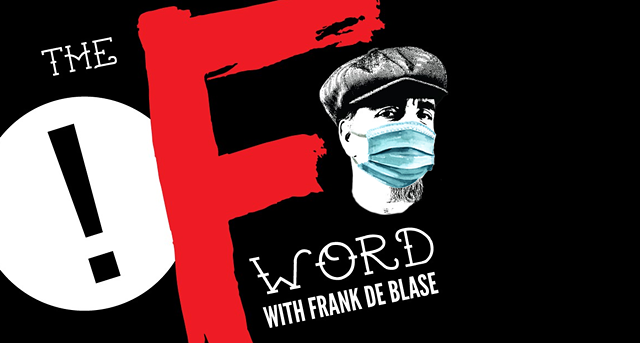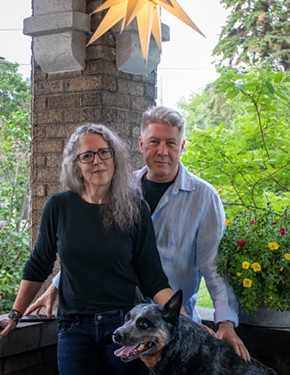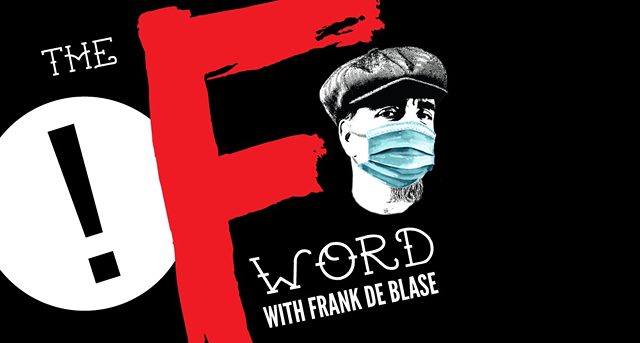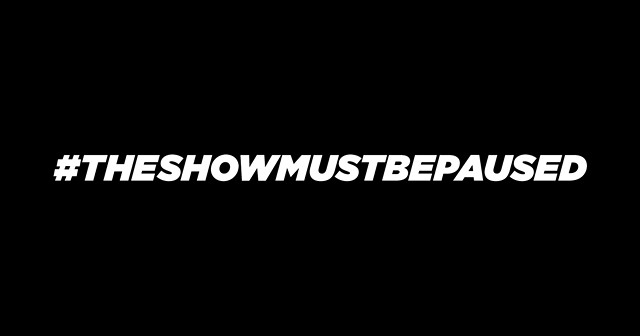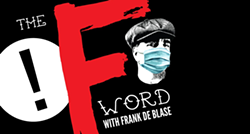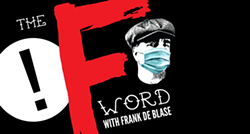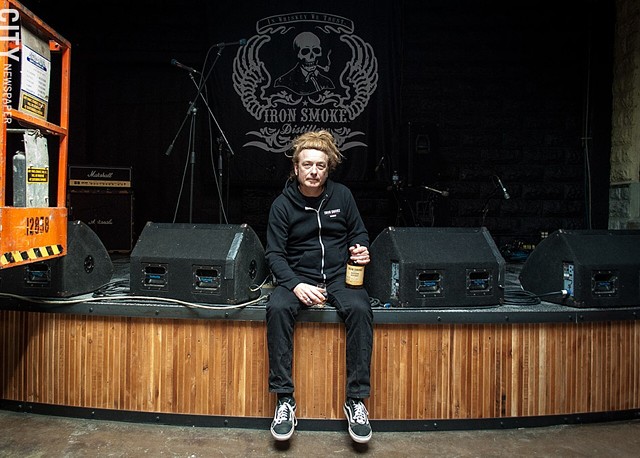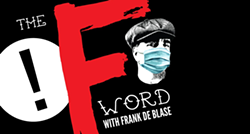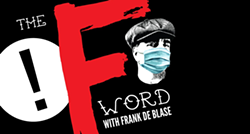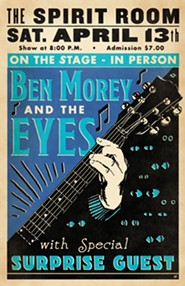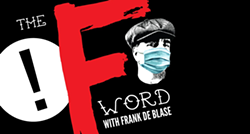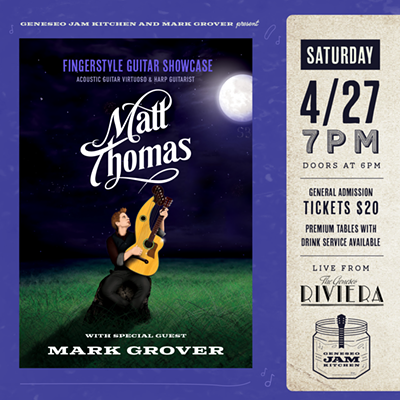Monday, February 8, 2021
The F Word: Local musicians eye return to live shows as COVID numbers decrease
Posted By Frank De Blase on Mon, Feb 8, 2021 at 2:55 PM
Look out, baby — live music is on its way back to your eager ears. Curfews are being lifted and COVID-19 numbers are going down.
Live-streamed concerts have kept a lot of purveyors of live music alive this past year. It picked up the slack and filled in the gaps. And yet the thrill is waning.
Don’t sweat it — it looks like the return of live music is just around the corner, to breathe fresh life into musicians who are tired of kowtowing to COVID and ready to move past online-only gigs.
Some musicians, like the Rochester garage rockers in Televisionaries, haven’t strayed from their pre-pandemic path.
“The Televisionaries have not changed anything except that we don’t play out live,” says Trevor Lake, the band’s lead guitarist. “We still rehearse weekly and have recorded a full-length record. Our goal is to ensure that we come out of all this better and tighter than ever.”
Lake says they haven’t really wanted to play socially distant gigs. “That’s not the vibe we represent as a band,” he says. “Our music thrives on sweaty, tightly packed clubs.”
But so does COVID-19. And so online concerts have become a less-than-ideal necessity for bands that want to stay in front of their fans during the pandemic.
Televisionaries have only played one live-streamed show during the pandemic, in order to retain the allure of a special, one-off event.
Anonymous Willpower’s lead singer Suzi Willpower makes the most of performing via livestream. “It's fun playing live shows in an empty room,” she says. “I imagine what it would be like if we all lived in space ships and we're only able to interact with people via satellite. But it just doesn't have the same feel as playing in front of a crowd.”
Anonymous Willpower has been adhering to social distancing as much as possible. “We are that close knit band who come to rehearsal, staying six feet apart, and playing together on a weekly to bi-weekly basis unless we feel even remotely ill,” Willpower says. “Any time we have any symptoms, we get tested. I have personally been tested seven times. Two for surgical procedures, and five for fearing being compromised by third-person parties.”
And with Willpower’s husband and keyboard player, Don Anonymous, battling leukemia, plus Suzi’s self-described “nightcap of health issues,” they'd rather be safe than sorry. And she says it’s good for the band’s creative health as well.
“We've been writing new material, recording, sending files back and forth to one another,” she says.
And as restrictions ease and the vaccine becomes more widely available, now seems like the right time for bands to get back up on the horse and reach out to venues about future gigs. The freeze on live shows seems to be thawing.
Frank De Blase is CITY's music writer. He can be reached at [email protected].
Live-streamed concerts have kept a lot of purveyors of live music alive this past year. It picked up the slack and filled in the gaps. And yet the thrill is waning.
Don’t sweat it — it looks like the return of live music is just around the corner, to breathe fresh life into musicians who are tired of kowtowing to COVID and ready to move past online-only gigs.
Some musicians, like the Rochester garage rockers in Televisionaries, haven’t strayed from their pre-pandemic path.
“The Televisionaries have not changed anything except that we don’t play out live,” says Trevor Lake, the band’s lead guitarist. “We still rehearse weekly and have recorded a full-length record. Our goal is to ensure that we come out of all this better and tighter than ever.”
Lake says they haven’t really wanted to play socially distant gigs. “That’s not the vibe we represent as a band,” he says. “Our music thrives on sweaty, tightly packed clubs.”
But so does COVID-19. And so online concerts have become a less-than-ideal necessity for bands that want to stay in front of their fans during the pandemic.
Televisionaries have only played one live-streamed show during the pandemic, in order to retain the allure of a special, one-off event.
Anonymous Willpower’s lead singer Suzi Willpower makes the most of performing via livestream. “It's fun playing live shows in an empty room,” she says. “I imagine what it would be like if we all lived in space ships and we're only able to interact with people via satellite. But it just doesn't have the same feel as playing in front of a crowd.”
Anonymous Willpower has been adhering to social distancing as much as possible. “We are that close knit band who come to rehearsal, staying six feet apart, and playing together on a weekly to bi-weekly basis unless we feel even remotely ill,” Willpower says. “Any time we have any symptoms, we get tested. I have personally been tested seven times. Two for surgical procedures, and five for fearing being compromised by third-person parties.”
And with Willpower’s husband and keyboard player, Don Anonymous, battling leukemia, plus Suzi’s self-described “nightcap of health issues,” they'd rather be safe than sorry. And she says it’s good for the band’s creative health as well.
“We've been writing new material, recording, sending files back and forth to one another,” she says.
And as restrictions ease and the vaccine becomes more widely available, now seems like the right time for bands to get back up on the horse and reach out to venues about future gigs. The freeze on live shows seems to be thawing.
Frank De Blase is CITY's music writer. He can be reached at [email protected].
Thursday, October 29, 2020
The F Word: 'Incidental' musicians
Posted By Frank De Blase on Thu, Oct 29, 2020 at 6:00 AM
COVID-19 has put a stranglehold on live music. Several words and phrases have been added to our pandemic lexicon, such as “new normal” and “physically distanced.” All musicians who perform regularly have had to reconsider their approaches — and many looking for gigs during quarantine have gotten lost in the shuffle.
But there are also those musicians who have been able to secure gigs despite scarce opportunities — those who play what New York state considers “incidental music.”
Yet another term to add to the growing pile of COVID-era jargon, “incidental music” serves as background sounds while you’re eating a physically distanced meal at your local restaurant or bar. The musical performance can’t be advertised, no tickets can be sold, and a cover isn’t charged. You’re paying for the meal — the music just happens to be playing at the time.
These rules put in place by the State Liquor Authority are meant to prevent venues from overcrowding during the pandemic and increasing the risk of transmitting the virus.
But incidental musicians have been playing long before the pandemic arrived. Such artists have always flown a bit under the radar, providing background music at coffee shops, cocktail bars, and restaurants .
Now, in an odd twist, they’re among the few musicians who can get reliable gigs. But they’ve also long been overlooked, ignored, or discounted as less relevant than other live musicians. So how do these performers feel about their “incidental” role?
Guitarist Fred Vine isn’t all that keen on the word. He sees it as a back-handed compliment.
“Well I never considered myself an incidental artist,” Vine says. “I find it rather demeaning.”
But he says it doesn’t really affect him that much. During happier, more prosperous times, he played intimate gigs at places like The Little Theatre Café, Record Archive’s Backroom Lounge, tour boat cruises on The Colonial Belle, various town events, and countless senior residential communities. He wasn’t a sell-out act, exactly, but he got reliable work with his precise, beautiful, and bluesy fingerstyle guitar.
Now in live music limbo, he’s categorized as an incidental musician, but that’s not necessarily a bad thing. Being incidental has prepared musicians like Vine for the impending adversity.
When New York state hit the pause button on live performances in March, musicians immediately lost paying gigs. Everyone whose music was conducive to an “incidental” setting went that route. Some went online to perform via livestream and play for tips. Others packed up their toys and went home. The lack of being able to play publicly or sell tickets for events has taken its toll.
“Well, it’s tough that we can’t advertise and we end up playing to just a handful of people,” says guitar player Tom Passamonte. He had a regularly scheduled gig at Pomodoro on University Avenue, with his group Special Blend serving as the house band, when COVID-19 hit and the restaurant shut down. “I really miss the connection with the audiences,” he says.
By definition, Special Blend fits the bill as an incidental act — music that is not the main attraction, but rather a compliment to dining. He plays a multitude of genres effortlessly with his trio, and that versatility has saved Special Blend during the pandemic, whereas some more conventional artists have been caught unaware. And it’s getting in the way of how we ingest our entertainment. But the artists aren’t looking for a miracle, they're looking for a gig.
Musicians understand the importance of combating the virus by keeping six feet apart and wearing masks. Still, the results are a bitter pill to swallow.
“I have a booking in November at Pane Vino on the Avenue, says Passamonte. “But nothing else yet. I have played a few outdoor things this past summer, but that’s about it. My regular Saturday gig at Woodcliff is on hold, too.”
Passamonte says he sees hope for 2021, but thinks live music won’t really return until next May.
“I’m looking forward to being busy again,” he says. “I love what I do.”
And that’s not so incidental.
Frank De Blase is CITY's music writer. He can be reached at [email protected].
Thursday, October 15, 2020
The F Word: The Big Adios
Posted By Frank De Blase on Thu, Oct 15, 2020 at 12:35 PM
You’ve heard it before from people fed up with politics: They've had enough and they’re going to leave the country.
Then, they don’t.
But local musician Sarah Long Hendershot — singer for The Jane Mutiny — and her husband of 11 years, fine arts photographer and software engineer Jones Hendershot, did. They sold their house in Irondequoit, packed their bags, and set their glims on Galicia, Spain.
Spain’s gain is Rochester’s loss. Long’s voice is riveting, as evidenced by The Jane Mutiny’s take on Bob Dylan’s “Girl From the North Country” or anything from Neil Young’s catalogue.
In addition to fronting The Jane Mutiny, Long spearheaded the wildly popular musical event “If All Rochester Wrote the Same Song.” Long has been in touch with several musicians such as Watkins and the Rapiers guitarist Steve Piper and singer-songwriter Sarah Eide, who have shown some interest in keeping the project going. And The Jane Mutiny will continue to record remotely over cyberspace, until it’s safe to travel. Then the band plans on playing in Spain.
Jones and Hendershot were at a crossroads, especially when it came to Hendershot’s reliance on insulin to maintain healthy blood-sugar levels. His body’s ability to produce the stuff was destroyed by Type 1 diabetes when he was a teenager. Without vigilant monitoring and daily insulin injections, Type 1 diabetics risk blindness, kidney disease, and death.
There are roughly 1.3 million people living with the disease in the United States and, like Hendershot, most of them are in a perpetual fight with insurance companies to cover their care.
“As we’ve gotten older, we’ve developed some uneasy feelings regarding Jones’ dependence on insulin in a for-profit healthcare system,” Long says. “We’ve been forced into the position of trusting his life to people who may not have his best interests at heart.”
They watched as the cost of insulin vials gradually crept upward from $12 to $480 over the years, and it became increasingly apparent to them that the healthcare system on which they were dependent was motivated by money rather than wellness.
And they described the system as sucking both from them as they approached their later years.
“When we were dealing with Sarah’s parents’ estate a few years ago, we began to recognize that our system is set up to extract as much money as possible from people as they approach the end of their lives,” Hendershot says. “We started discussing what our older years would look like, and we came to the difficult conclusion that we would have little control over our quality of life if we stayed in the U.S.”
Long says it was a realization that is hard for many Americans to see without stepping outside their country and looking inward.
“It’s sometimes difficult to see this from within the U.S., but when you get out from under it, the difference in general life satisfaction is astonishing,” Long says.
A new destination loomed on the horizon for the couple: España. So now it comes down to this; the big adios; the couple left the States for good on Oct. 13. Hendershot can now purchase his insulin for $20 over the counter.
Long and Hendershot both planned on being in Spain earlier, but the pandemic put everything on pause. The borders were completely closed. The Spanish consulate in New York City, on which the couple is dependent for visas, cancelled all appointments for a while.
“The visa process is incredibly involved,” Long says. “You have to be attentive to details and be very serious about giving them exactly what they are looking for.”
They put their house in Irondequoit up for sale and it sold in a day. So they kicked around, couch-surfing and staying with friends until their visas were approved and the Spanish border reopened.
The exercise of selling their home and offloading their belongings has been a gigantic leap of faith for them.
“We’ve carefully curated our lives, but we don’t want to be prisoners to our things,” Hendershot says. “So we are letting it all go for an idea that we are hoping to manifest. We want to be bold and brave and reap the rewards of that courage.”
They shopped online for a house for well over a year, and then went over to northern Spain to look at properties.
“It’s a breathtakingly beautiful place,” Long says.
The area has a water-rich microclimate that stays between 45 and 75 degrees year round. They fell in love with and purchased a property that includes a completely restored 15th-century mill. The Rio Castro runs through the backyard, and a race comes off the river and flows under the house. There’s the constant, peaceful sound of running water.
“It is primal,” Long says of the region where they’ll be living. “It’s humming with life and history. Not history like we think of it here. We’re talking 40,000-year-old petroglyphs and cave paintings. Our house is in the shadow of a 14th-century Norman castle. You can see it out the window when you’re washing the dishes.”
Long and Hendershot have specific plans for how to use the space once they move in.
“We want to have retreats at the house, doing what we’re best at — music, writing, photography,” Long says. At first the couple thought the pandemic was going to quash that idea, but now she thinks it might actually be the future of tourism.
“Restrict it to six people, practice social distancing — the possibilities are endless,” she says. “We want to incorporate the incredible culture of that region, with its Celtic and Druid roots — they call it ‘Witches’ Land’ — cook paella or pulpo in the outdoor oven, and have local musicians come and play by the riverbank.
“We’ve made many friends in Spain already — mostly artists and musicians, just like here. They are warm and welcoming. It’s a lovely, accepting culture.”
“We are excited to learn and grow from Spanish culture, and maybe introduce them to some of our Rochester strengths,” Long says. “You can put octopus on a garbage plate, right?”
Frank De Blase is CITY's music writer. He can be reached at [email protected].
Then, they don’t.
But local musician Sarah Long Hendershot — singer for The Jane Mutiny — and her husband of 11 years, fine arts photographer and software engineer Jones Hendershot, did. They sold their house in Irondequoit, packed their bags, and set their glims on Galicia, Spain.
Spain’s gain is Rochester’s loss. Long’s voice is riveting, as evidenced by The Jane Mutiny’s take on Bob Dylan’s “Girl From the North Country” or anything from Neil Young’s catalogue.
In addition to fronting The Jane Mutiny, Long spearheaded the wildly popular musical event “If All Rochester Wrote the Same Song.” Long has been in touch with several musicians such as Watkins and the Rapiers guitarist Steve Piper and singer-songwriter Sarah Eide, who have shown some interest in keeping the project going. And The Jane Mutiny will continue to record remotely over cyberspace, until it’s safe to travel. Then the band plans on playing in Spain.
Jones and Hendershot were at a crossroads, especially when it came to Hendershot’s reliance on insulin to maintain healthy blood-sugar levels. His body’s ability to produce the stuff was destroyed by Type 1 diabetes when he was a teenager. Without vigilant monitoring and daily insulin injections, Type 1 diabetics risk blindness, kidney disease, and death.
There are roughly 1.3 million people living with the disease in the United States and, like Hendershot, most of them are in a perpetual fight with insurance companies to cover their care.
“As we’ve gotten older, we’ve developed some uneasy feelings regarding Jones’ dependence on insulin in a for-profit healthcare system,” Long says. “We’ve been forced into the position of trusting his life to people who may not have his best interests at heart.”
They watched as the cost of insulin vials gradually crept upward from $12 to $480 over the years, and it became increasingly apparent to them that the healthcare system on which they were dependent was motivated by money rather than wellness.
And they described the system as sucking both from them as they approached their later years.
“When we were dealing with Sarah’s parents’ estate a few years ago, we began to recognize that our system is set up to extract as much money as possible from people as they approach the end of their lives,” Hendershot says. “We started discussing what our older years would look like, and we came to the difficult conclusion that we would have little control over our quality of life if we stayed in the U.S.”
Long says it was a realization that is hard for many Americans to see without stepping outside their country and looking inward.
“It’s sometimes difficult to see this from within the U.S., but when you get out from under it, the difference in general life satisfaction is astonishing,” Long says.
A new destination loomed on the horizon for the couple: España. So now it comes down to this; the big adios; the couple left the States for good on Oct. 13. Hendershot can now purchase his insulin for $20 over the counter.
Long and Hendershot both planned on being in Spain earlier, but the pandemic put everything on pause. The borders were completely closed. The Spanish consulate in New York City, on which the couple is dependent for visas, cancelled all appointments for a while.
“The visa process is incredibly involved,” Long says. “You have to be attentive to details and be very serious about giving them exactly what they are looking for.”
They put their house in Irondequoit up for sale and it sold in a day. So they kicked around, couch-surfing and staying with friends until their visas were approved and the Spanish border reopened.
The exercise of selling their home and offloading their belongings has been a gigantic leap of faith for them.
“We’ve carefully curated our lives, but we don’t want to be prisoners to our things,” Hendershot says. “So we are letting it all go for an idea that we are hoping to manifest. We want to be bold and brave and reap the rewards of that courage.”
They shopped online for a house for well over a year, and then went over to northern Spain to look at properties.
“It’s a breathtakingly beautiful place,” Long says.
The area has a water-rich microclimate that stays between 45 and 75 degrees year round. They fell in love with and purchased a property that includes a completely restored 15th-century mill. The Rio Castro runs through the backyard, and a race comes off the river and flows under the house. There’s the constant, peaceful sound of running water.
“It is primal,” Long says of the region where they’ll be living. “It’s humming with life and history. Not history like we think of it here. We’re talking 40,000-year-old petroglyphs and cave paintings. Our house is in the shadow of a 14th-century Norman castle. You can see it out the window when you’re washing the dishes.”
Long and Hendershot have specific plans for how to use the space once they move in.
“We want to have retreats at the house, doing what we’re best at — music, writing, photography,” Long says. At first the couple thought the pandemic was going to quash that idea, but now she thinks it might actually be the future of tourism.
“Restrict it to six people, practice social distancing — the possibilities are endless,” she says. “We want to incorporate the incredible culture of that region, with its Celtic and Druid roots — they call it ‘Witches’ Land’ — cook paella or pulpo in the outdoor oven, and have local musicians come and play by the riverbank.
“We’ve made many friends in Spain already — mostly artists and musicians, just like here. They are warm and welcoming. It’s a lovely, accepting culture.”
“We are excited to learn and grow from Spanish culture, and maybe introduce them to some of our Rochester strengths,” Long says. “You can put octopus on a garbage plate, right?”
Frank De Blase is CITY's music writer. He can be reached at [email protected].
Tuesday, August 18, 2020
The F Word: Listen to the weather
Posted By Frank De Blase on Tue, Aug 18, 2020 at 11:13 AM
I had an epiphany outside the Inn on Broadway in downtown Rochester on Saturday night.
For a nominal table fee of $25, folks could sit under the tent that was set up in the Inn’s parking lot and dig the blues of Steve Grills and the Roadmasters. You could hear it as you approached. Grills and his crew slung blue arrows that zinged and pinged and reverberated off the walls of the buildings nearby. It told me I was home.
It was a bluesy treat, especially with local great Joe Beard, sitting in and digging into the opulent Delta sound. The event was sold out, full of enthusiastic fans who were busy eating to the beat. It wasn’t crowded, but they couldn’t dance either, due to physical distancing protocols. OK, I did tap my foot a bit. I couldn’t help it. But it just felt so good seeing and hearing live music once again.
It was a particularly beautiful and balmy night. And during the performance, it got me thinking more about the weather. What is weather? Under its strict definition, weather is “the state of the atmosphere at a place and time.”
And as the band played on, it dawned on me —- the shuffles, the boogies, the eight-bar blues, the 12-bar blues —- it was all downright meteorological. They were weather, in a sense.
Teagan and the Tweeds rocked Three Heads Brewing from the inside out at a physically distanced show on an inclement Sunday evening. The first come, first served crowd was treated to a sit-down show by a stand-up band. In addition to the small but strong audience that had lined up outside, waiting for the doors to open, fans also took in the performance via livestream on the Three Heads website.
Teagan and the Tweeds are a hard-hitting act that can do anything. It’s a veritable Swiss Army knife of a band. They consistently deliver on the rock ‘n’ roll, but they can also go on musical jaunts that pull at your heart strings, like when Teagan Ward sings about her grandmother along with a prayer to St. Anthony, the patron saint of lost things. When the song was finished, it began to rain softly outside. Weather, huh?
For a nominal table fee of $25, folks could sit under the tent that was set up in the Inn’s parking lot and dig the blues of Steve Grills and the Roadmasters. You could hear it as you approached. Grills and his crew slung blue arrows that zinged and pinged and reverberated off the walls of the buildings nearby. It told me I was home.
It was a bluesy treat, especially with local great Joe Beard, sitting in and digging into the opulent Delta sound. The event was sold out, full of enthusiastic fans who were busy eating to the beat. It wasn’t crowded, but they couldn’t dance either, due to physical distancing protocols. OK, I did tap my foot a bit. I couldn’t help it. But it just felt so good seeing and hearing live music once again.
It was a particularly beautiful and balmy night. And during the performance, it got me thinking more about the weather. What is weather? Under its strict definition, weather is “the state of the atmosphere at a place and time.”
And as the band played on, it dawned on me —- the shuffles, the boogies, the eight-bar blues, the 12-bar blues —- it was all downright meteorological. They were weather, in a sense.
Teagan and the Tweeds rocked Three Heads Brewing from the inside out at a physically distanced show on an inclement Sunday evening. The first come, first served crowd was treated to a sit-down show by a stand-up band. In addition to the small but strong audience that had lined up outside, waiting for the doors to open, fans also took in the performance via livestream on the Three Heads website.
Teagan and the Tweeds are a hard-hitting act that can do anything. It’s a veritable Swiss Army knife of a band. They consistently deliver on the rock ‘n’ roll, but they can also go on musical jaunts that pull at your heart strings, like when Teagan Ward sings about her grandmother along with a prayer to St. Anthony, the patron saint of lost things. When the song was finished, it began to rain softly outside. Weather, huh?
Monday, August 10, 2020
The F Word: The new normal and the old weird
Posted By Frank De Blase on Mon, Aug 10, 2020 at 4:29 PM
Who would have thought I would have lasted this long — almost six months — without going out to see live music? Forget the “new normal,” I want the old weird back.
And that’s precisely why I headed over to Abilene Bar & Lounge’s backyard patio on Friday, along with about 20 other souls. Musicians Nate Coffey and Mary Monroe were simultaneously celebrating birthdays during an exuberant set that doubled as a live recording.
Coffee was “en fuego,” as they say in Madrid, with strong and fluid guitar-picking that borrowed from flamenco without too much larceny. The man borrows from a lot of genres, far and wide, just long enough to put his spin on it before returning the musical styles unscathed.
Coffey’s band, including Mary Monroe on harp, percussionist Steve Imburgia, and bassist Ron Edwards played a lengthy set under balmy weather and perfect skies. Multiple guests gave cameos — including flutist Tom Gravino, singer Teressa Wilcox, guitarist Herb Heinz, harmonica player Tim Brundusie, and David Young, playing two recorders at once. It was a perfect way to get back to seeing a band without the risk of burning up upon re-entry.
It felt so good, I had to do it again.
The next show was a physically distanced, picnic-friendly affair on Sunday afternoon at Corn Hill’s Gazebo at Lunsford Park, where the larger-than-life zydeco impresario Woody Woodward had booked guitarist Dave Riccioni, with his versatile band Dave and the Blue Cats. The band gave an extra jump to the blues under the dappled sun. It was as if Woodward had plugged in his personal boombox for all to enjoy.
Future shows at Corn Hill’s Gazebo include Head to the Roots on August 16, The Spring Chickens on August 23, and Cinnamon Jones and Eternal Soul on August 30. All shows run 4 to 7 p.m. There is no charge, and just remember: Mask it or casket. F out.
And that’s precisely why I headed over to Abilene Bar & Lounge’s backyard patio on Friday, along with about 20 other souls. Musicians Nate Coffey and Mary Monroe were simultaneously celebrating birthdays during an exuberant set that doubled as a live recording.
Coffee was “en fuego,” as they say in Madrid, with strong and fluid guitar-picking that borrowed from flamenco without too much larceny. The man borrows from a lot of genres, far and wide, just long enough to put his spin on it before returning the musical styles unscathed.
Coffey’s band, including Mary Monroe on harp, percussionist Steve Imburgia, and bassist Ron Edwards played a lengthy set under balmy weather and perfect skies. Multiple guests gave cameos — including flutist Tom Gravino, singer Teressa Wilcox, guitarist Herb Heinz, harmonica player Tim Brundusie, and David Young, playing two recorders at once. It was a perfect way to get back to seeing a band without the risk of burning up upon re-entry.
It felt so good, I had to do it again.
The next show was a physically distanced, picnic-friendly affair on Sunday afternoon at Corn Hill’s Gazebo at Lunsford Park, where the larger-than-life zydeco impresario Woody Woodward had booked guitarist Dave Riccioni, with his versatile band Dave and the Blue Cats. The band gave an extra jump to the blues under the dappled sun. It was as if Woodward had plugged in his personal boombox for all to enjoy.
Future shows at Corn Hill’s Gazebo include Head to the Roots on August 16, The Spring Chickens on August 23, and Cinnamon Jones and Eternal Soul on August 30. All shows run 4 to 7 p.m. There is no charge, and just remember: Mask it or casket. F out.
Tuesday, June 2, 2020
The F Word: Major record labels engage in one-day music shutdown
Posted By Frank De Blase on Tue, Jun 2, 2020 at 4:23 PM
From folk icon Woody Guthrie championing the American farmer to poet Gil Scott-Heron’s “Whitey on the Moon,” bad times can make for positive music full of reactive change, and the resulting good music can beget change for the better. Sadly this seems to happen when things are well past the boiling point, when it’s too late and we’re faced with anger, unrest, and riots like we did this past weekend.
Following the horrific murder of George Floyd while in custody of Minneapolis police May 25, there has been an immediate sense of fury. Once again, we look to music for release and relief.
This crime has awakened a beast in our collective consciousness. It has picked at wounds that won’t be healed by solemnly singing “We Shall Overcome.” But the music must lead passionately and loudly, with appropriate anger.
Two leaders in the music industry — Jamila Thomas of Atlantic Records and Brianna Agyemang of Platoon — have a slightly different idea: shut down. Shut down for a day to show support for the families of George Floyd and other victims of police violence, as well as the black community as a whole. The intention is to provoke a real conversation about how to best lift up the black community in tangible and effective ways.
It is no doubt well-intentioned, but a lot of music stores and businesses just opened back up after being on lock-down for nearly three months. To propose shutting down may not be the best idea. Record stores such as Rochester’s Record Archive are opting to support the cause by donating money to Black Lives Matter.
“There was no specific directive suggested,” Record Archive’s co-owner Alayna Alderman says. “But donating money definitely works.”
On today, June 2, the Universal Music Group announced that it will observe what has been dubbed “Blackout Tuesday” as a “day to contemplate, connect, and organize," the company wrote Sunday on Instagram. "We stand with the black community. #TheShowMustBePaused."
This blackout directive has spread to the likes of Atlantic Records, Capitol Music Group, Columbia Records, Def Jam, Elektra Music Group, HitCo, Interscope Records, Geffen Records, A&M Records, Island Records, Pulse Music Group, Reservoir, Republic Records, Sony/ATV, Sony Music, Virgin EMI, and Warner Records. They have all pledged to cease business activity for the day.
“This is not a day off,” read a statement from Columbia Records. “Instead this is a day to reflect and figure out ways to move forward in solidarity. We continue to support the black community, our staff, artists, and peers in the music industry. Perhaps with the music off we can truly listen.”
Frank De Blase is CITY's music writer. He can be reached at [email protected].
Following the horrific murder of George Floyd while in custody of Minneapolis police May 25, there has been an immediate sense of fury. Once again, we look to music for release and relief.
This crime has awakened a beast in our collective consciousness. It has picked at wounds that won’t be healed by solemnly singing “We Shall Overcome.” But the music must lead passionately and loudly, with appropriate anger.
Two leaders in the music industry — Jamila Thomas of Atlantic Records and Brianna Agyemang of Platoon — have a slightly different idea: shut down. Shut down for a day to show support for the families of George Floyd and other victims of police violence, as well as the black community as a whole. The intention is to provoke a real conversation about how to best lift up the black community in tangible and effective ways.
It is no doubt well-intentioned, but a lot of music stores and businesses just opened back up after being on lock-down for nearly three months. To propose shutting down may not be the best idea. Record stores such as Rochester’s Record Archive are opting to support the cause by donating money to Black Lives Matter.
“There was no specific directive suggested,” Record Archive’s co-owner Alayna Alderman says. “But donating money definitely works.”
On today, June 2, the Universal Music Group announced that it will observe what has been dubbed “Blackout Tuesday” as a “day to contemplate, connect, and organize," the company wrote Sunday on Instagram. "We stand with the black community. #TheShowMustBePaused."
This blackout directive has spread to the likes of Atlantic Records, Capitol Music Group, Columbia Records, Def Jam, Elektra Music Group, HitCo, Interscope Records, Geffen Records, A&M Records, Island Records, Pulse Music Group, Reservoir, Republic Records, Sony/ATV, Sony Music, Virgin EMI, and Warner Records. They have all pledged to cease business activity for the day.
“This is not a day off,” read a statement from Columbia Records. “Instead this is a day to reflect and figure out ways to move forward in solidarity. We continue to support the black community, our staff, artists, and peers in the music industry. Perhaps with the music off we can truly listen.”
Frank De Blase is CITY's music writer. He can be reached at [email protected].
Thursday, May 21, 2020
The F Word: Record Archive still spinning
Posted By Frank De Blase on Thu, May 21, 2020 at 4:10 PM
With an unpredictable future looming precariously before them, Rochester-area music stores and venue owners have been caught in a kind of COVID-19 limbo. In this final edition of The F-Word series about how such businesses are surviving, CITY music writer Frank De Blase checks in with Record Archive.
This recent pandemic has ravaged the lives and careers of countless people, both here and abroad. Rochester is resilient and undoubtedly tough, but there are still scars to admire and stories to be told. Tales of dealing with distancing, wearing masks,washing our hands seemingly a thousand times a day, and self-quarantines. Wi-Fi is the new virtual commodity. COVID-19 is rendering our lives financially, emotionally, and physically compromised. It sucks.
Record Archive has been a constant in the Rochester scene for 45 years, selling recorded music in all its forms, plus a wild display of knicks and knacks and odds and ends. Alayna Alderman has been there, flashing a gregarious grin, for 35 years of the store’s existence.
The Record Archive’s vice president and co-owner with Richard Storms, Alderman is one tough lady. A pop culture champion, a retail visionary, a mover and a shaker, and a mother of three. And yet she was caught unaware in the wash of this terrible viral tsunami, like so many other business owners in the entertainment and hospitality trades.
Initially, Alderman felt shock, fear, and the ultimate sadness of laying off her entire staff, 19 employees in all.
“I was heartbroken, tearful and frustrated,” Alderman says. “Next came the wave of uncertainty of ‘How long will this last?’ and ‘Can we all survive it?’ And now it is the acceptance of knowing so many people have lost their lives during this, and it's not over. In addition, we are trying to reopen, rebuild and re-establish ourselves.”
The effects of the pandemic have also impacted Alderman on a personal level.
“Trying to stay positive and upbeat for my children has been a tremendous challenge,” she says. “Also, I simply miss my friends. The only upshot of this ‘pause’ is that it gives you time to think and identify what's really important.”
Even before the pandemic, the record industry had been hit hard as of late, with changing trends in technology and the culture of shopping. But it was “never this severe,” Alderman says.
“Discount retailers devaluing music, competing with free digital music, and the ongoing issues with distribution of physical goods in the marketplace are just a few hurdles that I must clear,” she says. “But never like this. It's eerie.”
On Friday, March 13, it was still business as usual, as the RA still hosted its Happy Hour in the Backroom Lounge. Opened in 2016, this live music venue and event space in the backroom of the record store can hold 150 rockin’ souls. and offers over 100 beers and more than 50 wines, plus spiked seltzers, hard ciders and sparkling wines.
“The room was full that night, but you could feel a heaviness in the air,” says Alderman. “The buzz went from the typical lighthearted chatter of music and beer to a nervousness of ‘What the hell is going on?’ As the reports of infections and deaths continued to climb, we decided to close.” That was on Wednesday, March 17.

Flash-forward to today: Alderman has her eyes on the prize — an imminent re-opening — and has gone through all the necessary steps to ensure financial viability. These actions include obtaining a Payroll Protection Program loan from the federal government, engaging in brisk online selling at shop.recordarchive.com (something they have always done), and ramping up listings on third-party platforms like Ebay, Discogs, and Amazon.
Record Archive is also getting its physical store ready at 33 1/3 Rockwood Street to make sure the business is compliant with guidelines from the Centers for Disease Control, once it is able to open again during Phase Two of New York state’s reopening plan.
“We have already installed plexi shields at the front counters, socially distancing markers on the floors, sanitizing stations throughout the space, and all the other CDC recommendations to the best of our ability,” she says.
The Backroom Lounge will have to wait a bit longer before opening, but Alderman is anticipating opening it as part of Phase Three or Four, with what she expects to be 50-percent capacity to start. She says the lounge has bookings well into 2021.
“I wouldn't say it will be back to normal or anything like that,” Alderman says.” We will be moving forward in new ways. I am cautiously optimistic.”
Frank De Blase is CITY's music writer. He can be reached at [email protected].
This recent pandemic has ravaged the lives and careers of countless people, both here and abroad. Rochester is resilient and undoubtedly tough, but there are still scars to admire and stories to be told. Tales of dealing with distancing, wearing masks,washing our hands seemingly a thousand times a day, and self-quarantines. Wi-Fi is the new virtual commodity. COVID-19 is rendering our lives financially, emotionally, and physically compromised. It sucks.
Record Archive has been a constant in the Rochester scene for 45 years, selling recorded music in all its forms, plus a wild display of knicks and knacks and odds and ends. Alayna Alderman has been there, flashing a gregarious grin, for 35 years of the store’s existence.
The Record Archive’s vice president and co-owner with Richard Storms, Alderman is one tough lady. A pop culture champion, a retail visionary, a mover and a shaker, and a mother of three. And yet she was caught unaware in the wash of this terrible viral tsunami, like so many other business owners in the entertainment and hospitality trades.
Initially, Alderman felt shock, fear, and the ultimate sadness of laying off her entire staff, 19 employees in all.
“I was heartbroken, tearful and frustrated,” Alderman says. “Next came the wave of uncertainty of ‘How long will this last?’ and ‘Can we all survive it?’ And now it is the acceptance of knowing so many people have lost their lives during this, and it's not over. In addition, we are trying to reopen, rebuild and re-establish ourselves.”
The effects of the pandemic have also impacted Alderman on a personal level.
“Trying to stay positive and upbeat for my children has been a tremendous challenge,” she says. “Also, I simply miss my friends. The only upshot of this ‘pause’ is that it gives you time to think and identify what's really important.”
Even before the pandemic, the record industry had been hit hard as of late, with changing trends in technology and the culture of shopping. But it was “never this severe,” Alderman says.
“Discount retailers devaluing music, competing with free digital music, and the ongoing issues with distribution of physical goods in the marketplace are just a few hurdles that I must clear,” she says. “But never like this. It's eerie.”
On Friday, March 13, it was still business as usual, as the RA still hosted its Happy Hour in the Backroom Lounge. Opened in 2016, this live music venue and event space in the backroom of the record store can hold 150 rockin’ souls. and offers over 100 beers and more than 50 wines, plus spiked seltzers, hard ciders and sparkling wines.
“The room was full that night, but you could feel a heaviness in the air,” says Alderman. “The buzz went from the typical lighthearted chatter of music and beer to a nervousness of ‘What the hell is going on?’ As the reports of infections and deaths continued to climb, we decided to close.” That was on Wednesday, March 17.
Related The sites for sounds: A curated guide to essential local concert venues

The sites for sounds
A curated guide to essential local concert venues
Annual Manual
Flash-forward to today: Alderman has her eyes on the prize — an imminent re-opening — and has gone through all the necessary steps to ensure financial viability. These actions include obtaining a Payroll Protection Program loan from the federal government, engaging in brisk online selling at shop.recordarchive.com (something they have always done), and ramping up listings on third-party platforms like Ebay, Discogs, and Amazon.
Record Archive is also getting its physical store ready at 33 1/3 Rockwood Street to make sure the business is compliant with guidelines from the Centers for Disease Control, once it is able to open again during Phase Two of New York state’s reopening plan.
“We have already installed plexi shields at the front counters, socially distancing markers on the floors, sanitizing stations throughout the space, and all the other CDC recommendations to the best of our ability,” she says.
The Backroom Lounge will have to wait a bit longer before opening, but Alderman is anticipating opening it as part of Phase Three or Four, with what she expects to be 50-percent capacity to start. She says the lounge has bookings well into 2021.
“I wouldn't say it will be back to normal or anything like that,” Alderman says.” We will be moving forward in new ways. I am cautiously optimistic.”
Frank De Blase is CITY's music writer. He can be reached at [email protected].
Wednesday, May 13, 2020
The F Word: Iron Smoke Distillery chases coronavirus with whiskey
Posted By Frank De Blase on Wed, May 13, 2020 at 5:05 PM
[UPDATED 5/14/20] This article has been updated to include information on the newly announced online event "Wag the Jaw with Tommy Brunett."
Tommy Brunett is a triple threat. He’s the CEO and founder of Iron Smoke Distillery, the 56-time award-winning whiskey company in Fairport. Brunett also runs the tasting room and live music venue on-site, and he’s a musician himself as frontman for the Tommy Brunett Band.
Earlier in his career, Brunett played guitar with the Rochester heavy metal mavens in Immaculate Mary, the band that displaced The Who as the “Loudest Band in the World” in 1988. The guy clearly knows how to let loose, and he’s brought that vibe to his distillery.
So the whiskey was flowin’, the joint was jumpin’, and the guitars were twangin’. Everything was jake; it was Shangri-La di da. Nobody saw it coming.
Then along came the COVID-19 sneak attack, and things fell silent. Brunett was hit in all places that you don’t want to be hit. He found himself having to adjust, just like the rest of the planet.
“I was on the road when the wheels came off in early March, and left to come home early after a cancelled event in Fort Lauderdale,” he says. It hit him hard as a business owner. “It was a long, uneasy, and contemplative trip home,” he says.
On a personal level, Brunett clearly has empathy for those tasked with battling the pandemic directly. He recently gained traction with the timely and beautiful song “Angels in the Rafters” — and its accompanying video — with fellow Rochester musician Elvio Fernandes. Lyrically, the track explores the plight of first responders during the pandemic.
Brunett’s company reflects this empathy as well. Iron Smoke adapted quickly, shifting to the production of hand sanitizer and partnering with Rochester Midland Corporation to distribute approximately 15,000 gallons of the product to hospitals, first responders, and other workers on the front lines who are most at risk of contracting the virus.
“We would make it, bottle it, and they would sell it and distribute it,” he says. “When the fishermen can’t fish, they fix their nets. That’s what I’ve been telling people, to encourage them to not stop being productive and turn this into some positive.”
As a venue owner, Brunett had been getting his legs under him. Iron Smoke was a cool joint, and more and more people were coming out before COVID-19 kicked those same legs out from under him. Brunett didn’t know what to do, until he had breakfast with Rochester radio icon Brother Wease, who offered some sage but not exactly encouraging advice.
“I had lunch with Wease in Florida the day I headed back up to the ROC,” Brunett says. “And I told him that I was a bit distracted because of the whole thing, as far as the tasting room/venue side of the business quickly turning to shit, and I was trying to figure out what to do. And he said, ‘What’s there to figure out? You’re fucked, brah. Just realize it.’
“He was right,” Brunett says. “We would all go on to be fucked for a while, and hearing him say that about the live music and bar side of things brought me a little comfort in a very strange way. Then it was on to figuring out the rest of things.”
Brunett wasn’t just concerned about his business. He worried that the livelihoods of working musicians had become collateral damage — just part of what makes COVID-19 so insidious.
“As a musician, my heart completely fell out of my chest for all of my friends and cohorts depending on income from touring,” he says. “All sides: production, artists, promoters, venues. This is a world I know and have operated in, so it was crushing to think of them and their families without the ships sailing.”
Despite the choppy waters caused by the economic downturn, Brunett says that Iron Smoke has been able to keep its staff employed, helped in part by participating in the Paycheck Protection Program, or PPP.
Brunett also credits their weekly contributions of hand sanitizer to healthcare workers and others in need as a way to stay focused and express gratitude. “It feels good that we can make a small but sometimes significant contribution to the new rockstars out there,” he says.
Iron Smoke Distillery’s support for the community extends to bartenders and musicians who have been affected by the pandemic. On its newly created website Smoke Out COVID-19, Iron Smoke enables people to tip bartenders and musicians, who post videos of original drink recipes and songs, respectively.
Brunett is also reaching out online with a new talk show, entitled "Wag the Jaw with Tommy Brunett," which premieres live on Thursday, May 14, at 5 p.m. via YouTube, Facebook, and Instagram. Stemming from happy hours that he had been hosting on Zoom, his show will "lifestyle, music and, booze." The first show will feature virtual visits from reality TV stars — including the Greece-based psychic Jennie Marie of the TLC program "Mama Medium" — and a musical performance from Rochester's Todd Kraszman.
Believe it or not, whiskey sales are up overall, despite the pandemic. Brunett’s whiskeys ain’t your daddy’s spirits. It’s whiskey with a hint of smoke. For aficionados, that’s two great tastes in one that came from a serendipitous, you-got-your-peanut-butter-in-my-chocolate moment.
“I came up with the idea in the backyard in 2011, while getting my whiskey swerve on and smoking ribs — merging two great American pastimes of tasty BBQ and traditional whiskey-making,” Brunett says. Iron Smoke, a small-batch distillery that sources its liquor exclusively with local ingredients, will have its 10th anniversary next year.
Brunett has no particular insight, no crystal ball as to when this will all be over. He’s busy. There’s whiskey and hand sanitizer to be made, patrons to be served, rock to be rolled. There’s no time for worry.
“Change happens almost minute to minute right about now,” he says. “We’ll get there, but we need to figure out how to beat the virus before ‘back to normal’ happens, and that will be a while. The hardest thing to hear from my friends in the touring community is that it may be a long haul: 18 months or more before the crowds start roaring again. God only knows.”
Frank De Blase is CITY's music writer. He can be reached at [email protected].
Tommy Brunett is a triple threat. He’s the CEO and founder of Iron Smoke Distillery, the 56-time award-winning whiskey company in Fairport. Brunett also runs the tasting room and live music venue on-site, and he’s a musician himself as frontman for the Tommy Brunett Band.
Earlier in his career, Brunett played guitar with the Rochester heavy metal mavens in Immaculate Mary, the band that displaced The Who as the “Loudest Band in the World” in 1988. The guy clearly knows how to let loose, and he’s brought that vibe to his distillery.
So the whiskey was flowin’, the joint was jumpin’, and the guitars were twangin’. Everything was jake; it was Shangri-La di da. Nobody saw it coming.
Then along came the COVID-19 sneak attack, and things fell silent. Brunett was hit in all places that you don’t want to be hit. He found himself having to adjust, just like the rest of the planet.
“I was on the road when the wheels came off in early March, and left to come home early after a cancelled event in Fort Lauderdale,” he says. It hit him hard as a business owner. “It was a long, uneasy, and contemplative trip home,” he says.
On a personal level, Brunett clearly has empathy for those tasked with battling the pandemic directly. He recently gained traction with the timely and beautiful song “Angels in the Rafters” — and its accompanying video — with fellow Rochester musician Elvio Fernandes. Lyrically, the track explores the plight of first responders during the pandemic.
Brunett’s company reflects this empathy as well. Iron Smoke adapted quickly, shifting to the production of hand sanitizer and partnering with Rochester Midland Corporation to distribute approximately 15,000 gallons of the product to hospitals, first responders, and other workers on the front lines who are most at risk of contracting the virus.
“We would make it, bottle it, and they would sell it and distribute it,” he says. “When the fishermen can’t fish, they fix their nets. That’s what I’ve been telling people, to encourage them to not stop being productive and turn this into some positive.”
As a venue owner, Brunett had been getting his legs under him. Iron Smoke was a cool joint, and more and more people were coming out before COVID-19 kicked those same legs out from under him. Brunett didn’t know what to do, until he had breakfast with Rochester radio icon Brother Wease, who offered some sage but not exactly encouraging advice.
“I had lunch with Wease in Florida the day I headed back up to the ROC,” Brunett says. “And I told him that I was a bit distracted because of the whole thing, as far as the tasting room/venue side of the business quickly turning to shit, and I was trying to figure out what to do. And he said, ‘What’s there to figure out? You’re fucked, brah. Just realize it.’
“He was right,” Brunett says. “We would all go on to be fucked for a while, and hearing him say that about the live music and bar side of things brought me a little comfort in a very strange way. Then it was on to figuring out the rest of things.”
Brunett wasn’t just concerned about his business. He worried that the livelihoods of working musicians had become collateral damage — just part of what makes COVID-19 so insidious.
“As a musician, my heart completely fell out of my chest for all of my friends and cohorts depending on income from touring,” he says. “All sides: production, artists, promoters, venues. This is a world I know and have operated in, so it was crushing to think of them and their families without the ships sailing.”
Despite the choppy waters caused by the economic downturn, Brunett says that Iron Smoke has been able to keep its staff employed, helped in part by participating in the Paycheck Protection Program, or PPP.
Brunett also credits their weekly contributions of hand sanitizer to healthcare workers and others in need as a way to stay focused and express gratitude. “It feels good that we can make a small but sometimes significant contribution to the new rockstars out there,” he says.
Iron Smoke Distillery’s support for the community extends to bartenders and musicians who have been affected by the pandemic. On its newly created website Smoke Out COVID-19, Iron Smoke enables people to tip bartenders and musicians, who post videos of original drink recipes and songs, respectively.
Brunett is also reaching out online with a new talk show, entitled "Wag the Jaw with Tommy Brunett," which premieres live on Thursday, May 14, at 5 p.m. via YouTube, Facebook, and Instagram. Stemming from happy hours that he had been hosting on Zoom, his show will "lifestyle, music and, booze." The first show will feature virtual visits from reality TV stars — including the Greece-based psychic Jennie Marie of the TLC program "Mama Medium" — and a musical performance from Rochester's Todd Kraszman.
Believe it or not, whiskey sales are up overall, despite the pandemic. Brunett’s whiskeys ain’t your daddy’s spirits. It’s whiskey with a hint of smoke. For aficionados, that’s two great tastes in one that came from a serendipitous, you-got-your-peanut-butter-in-my-chocolate moment.
“I came up with the idea in the backyard in 2011, while getting my whiskey swerve on and smoking ribs — merging two great American pastimes of tasty BBQ and traditional whiskey-making,” Brunett says. Iron Smoke, a small-batch distillery that sources its liquor exclusively with local ingredients, will have its 10th anniversary next year.
Brunett has no particular insight, no crystal ball as to when this will all be over. He’s busy. There’s whiskey and hand sanitizer to be made, patrons to be served, rock to be rolled. There’s no time for worry.
“Change happens almost minute to minute right about now,” he says. “We’ll get there, but we need to figure out how to beat the virus before ‘back to normal’ happens, and that will be a while. The hardest thing to hear from my friends in the touring community is that it may be a long haul: 18 months or more before the crowds start roaring again. God only knows.”
Frank De Blase is CITY's music writer. He can be reached at [email protected].
Thursday, May 7, 2020
The F Word: There are no shows, but Alison Coté's rock 'n' roll art goes on
Posted By Frank De Blase on Thu, May 7, 2020 at 4:59 PM
With an unpredictable future looming precariously before them, Rochester-area musicians and the artists who help promote them have been caught in a kind of COVID-19 limbo. In this ongoing series of The F-Word, CITY music writer Frank De Blase finds out how various players in the local scene are staying afloat.
Graphic designer Alison Coté’s posters are so ubiquitous in the Rochester music scene, it seems a local show just isn’t ready for the stage until it has a slick showbill from Coté to accompany it.
Her style is adaptable to whatever her musical clients can dream up, but Coté has a clear affinity for vintage aesthetics that range from “Live at the Apollo” to B-movie schlock ‘n’ roll. An Alison Coté poster is typically 11 by 17 inches, and will run you $100 and up. Since 2016, Coté’s been creating these works, which can be seen on lampposts and in shop and venue windows throughout the city.
Enter COVID-19, exit the shows and the posters that promoted them. Before the scene came crashing down around our ears, the 27-year-old Coté was designing 10 to 15 posters a month for local and traveling shows.
That’s gone away, but “not entirely,” she says. “I’m still doing some work for optimistic folks who have shows planned for later this year.” Point of the Bluff Vineyards — with events planned for late summer at its location in Hammondsport near Keuka Lake — is among those hopeful clients commissioning new concert posters.
Coté stays busy, working out of her Penfield studio, the walls brightly accented with some of her art as well as that of others. The workspace, which contains only her computer and mid-century dollhouse collection, isn’t as cluttered as one might think. She used to work in physical mediums more. “It’s strictly a digital endeavor now,” she says.
Despite her obvious talent, Coté has precious little training; her time in college was abbreviated. After attending Pratt School of Design for a year and a half, she quit her formal education and began learning from her professional-artist parents, David Cowles and Laura Wilder.
Coté’s works are highly recognizable, in large part because of the transparency of her influences. “I’m inspired by all things vintage and retro,” she says. “I especially love kitschy, playful design from the 1950s and 1960s.”
Her first concert posters were created for her husband Alex’s rock band, Dangerbyrd. Gradually, friends from other bands began asking her to create additional posters. Eventually, when demand started to get too high, Coté had to start charging, and poster design became her profession.
A lot of Coté’s current work is coming from bands and artists who are taking advantage of being cooped up in quarantine and recording a lot more. It’s a surge of creativity. Those resulting new albums, LPs, EPs, CDs, and singles — released by the likes of Trevor Lake, Dangerbyrd, and Greg Townson — need cover artwork. For this, Coté charges between $150 and $500.
“I think Alison is great to work with because she communicates very well,” says Lake, Televisionaries’ guitarist and drummer for both Dangerbyrd and The Hi-Risers. “I’m also pretty vague with my ideas and she puts together a masterpiece from my not-so-descriptive ideas. She’s also mad cool.”
Frank De Blase is CITY's music writer. He can be reached at [email protected].
Graphic designer Alison Coté’s posters are so ubiquitous in the Rochester music scene, it seems a local show just isn’t ready for the stage until it has a slick showbill from Coté to accompany it.
Her style is adaptable to whatever her musical clients can dream up, but Coté has a clear affinity for vintage aesthetics that range from “Live at the Apollo” to B-movie schlock ‘n’ roll. An Alison Coté poster is typically 11 by 17 inches, and will run you $100 and up. Since 2016, Coté’s been creating these works, which can be seen on lampposts and in shop and venue windows throughout the city.
Enter COVID-19, exit the shows and the posters that promoted them. Before the scene came crashing down around our ears, the 27-year-old Coté was designing 10 to 15 posters a month for local and traveling shows.
That’s gone away, but “not entirely,” she says. “I’m still doing some work for optimistic folks who have shows planned for later this year.” Point of the Bluff Vineyards — with events planned for late summer at its location in Hammondsport near Keuka Lake — is among those hopeful clients commissioning new concert posters.
Coté stays busy, working out of her Penfield studio, the walls brightly accented with some of her art as well as that of others. The workspace, which contains only her computer and mid-century dollhouse collection, isn’t as cluttered as one might think. She used to work in physical mediums more. “It’s strictly a digital endeavor now,” she says.
Despite her obvious talent, Coté has precious little training; her time in college was abbreviated. After attending Pratt School of Design for a year and a half, she quit her formal education and began learning from her professional-artist parents, David Cowles and Laura Wilder.
Coté’s works are highly recognizable, in large part because of the transparency of her influences. “I’m inspired by all things vintage and retro,” she says. “I especially love kitschy, playful design from the 1950s and 1960s.”
Her first concert posters were created for her husband Alex’s rock band, Dangerbyrd. Gradually, friends from other bands began asking her to create additional posters. Eventually, when demand started to get too high, Coté had to start charging, and poster design became her profession.
A lot of Coté’s current work is coming from bands and artists who are taking advantage of being cooped up in quarantine and recording a lot more. It’s a surge of creativity. Those resulting new albums, LPs, EPs, CDs, and singles — released by the likes of Trevor Lake, Dangerbyrd, and Greg Townson — need cover artwork. For this, Coté charges between $150 and $500.
“I think Alison is great to work with because she communicates very well,” says Lake, Televisionaries’ guitarist and drummer for both Dangerbyrd and The Hi-Risers. “I’m also pretty vague with my ideas and she puts together a masterpiece from my not-so-descriptive ideas. She’s also mad cool.”
Frank De Blase is CITY's music writer. He can be reached at [email protected].
Tuesday, May 5, 2020
The F Word: Bernunzio Uptown Music is still strumming
Posted By Frank De Blase on Tue, May 5, 2020 at 4:36 PM
With an unpredictable future looming precariously before them, Rochester-area music stores, in addition to club owners, have been caught in a kind of COVID-19 limbo. In this ongoing series of The F-Word, CITY music writer Frank De Blase finds out how such businesses are staying afloat.
John Bernunzio, owner of Bernunzio Uptown Music on East Avenue, has been an East End fixture for years, a devoted music fan and purveyor of just about anything with strings. And the man has a real affinity for hats, evidenced by the line of Stetson he sells at the store. This is the guy who, after hearing that the Preservation Hall Jazz Band’s banjo player had lost his instrument in the floodwaters of Hurricane Katrina, gave the man a replacement when he was scheduled to play the Rochester International Jazz Festival that year.
Before the pandemic, you could stroll into Bernunzio’s store and be immediately awestruck by all the six-string beauties lined up on the walls, like a fine furniture parade of vintage fiddles, mandolins, banjos, ukuleles, and guitars. For now, some of these instruments may have to wait a little longer for their turn in the loving arms of the eager musicians who flock to the place.
The showroom at Bernunzio Uptown Music on East Avenue is officially closed for now, another unfortunate and hopefully temporary loss for local musicians in a long line of COVID-19 setbacks. But that’s not to say Bernunzio has completely shut down the operations. The business is still filling orders for instruments by mail, as it has for 40 years, and has begun curbside pick-up and delivery in keeping with physical distancing guidelines. Bernunzio is also selling instruments on consignment.
With the physical store shut down, a lot has changed in a short amount of time. But Bernunzio says it sometimes feels like the old days.
“We still sell a banjo or ukulele now and then,” he says. “The interesting thing is people are making a lot of music at home. They’re doing things from home and so they have some time to play. The downside of the whole thing is that our customers are musicians and their income is seriously curtailed.”
Ultimately, Bernunzio is unclear about when he will be able to open the store again. He does seem to think that there will be irreversible differences in how we consume and communicate through music, even after the pandemic subsides.
“I think smaller venues will be important,” he says. “I can’t see people flocking to giant events, at least for another year, if at all. I think the whole thing is giving us an inward perspective on what is important. Musically, I think everyone has agreed to the importance of it in our lives but how it gets delivered could be drastically changed.”
He adds: “The idea of quarantine and the idea of buying local kind of go hand-in-hand.”
Frank De Blase is CITY's music writer. He can be reached at [email protected].
John Bernunzio, owner of Bernunzio Uptown Music on East Avenue, has been an East End fixture for years, a devoted music fan and purveyor of just about anything with strings. And the man has a real affinity for hats, evidenced by the line of Stetson he sells at the store. This is the guy who, after hearing that the Preservation Hall Jazz Band’s banjo player had lost his instrument in the floodwaters of Hurricane Katrina, gave the man a replacement when he was scheduled to play the Rochester International Jazz Festival that year.
Before the pandemic, you could stroll into Bernunzio’s store and be immediately awestruck by all the six-string beauties lined up on the walls, like a fine furniture parade of vintage fiddles, mandolins, banjos, ukuleles, and guitars. For now, some of these instruments may have to wait a little longer for their turn in the loving arms of the eager musicians who flock to the place.
The showroom at Bernunzio Uptown Music on East Avenue is officially closed for now, another unfortunate and hopefully temporary loss for local musicians in a long line of COVID-19 setbacks. But that’s not to say Bernunzio has completely shut down the operations. The business is still filling orders for instruments by mail, as it has for 40 years, and has begun curbside pick-up and delivery in keeping with physical distancing guidelines. Bernunzio is also selling instruments on consignment.
With the physical store shut down, a lot has changed in a short amount of time. But Bernunzio says it sometimes feels like the old days.
“We still sell a banjo or ukulele now and then,” he says. “The interesting thing is people are making a lot of music at home. They’re doing things from home and so they have some time to play. The downside of the whole thing is that our customers are musicians and their income is seriously curtailed.”
Ultimately, Bernunzio is unclear about when he will be able to open the store again. He does seem to think that there will be irreversible differences in how we consume and communicate through music, even after the pandemic subsides.
“I think smaller venues will be important,” he says. “I can’t see people flocking to giant events, at least for another year, if at all. I think the whole thing is giving us an inward perspective on what is important. Musically, I think everyone has agreed to the importance of it in our lives but how it gets delivered could be drastically changed.”
He adds: “The idea of quarantine and the idea of buying local kind of go hand-in-hand.”
Frank De Blase is CITY's music writer. He can be reached at [email protected].




